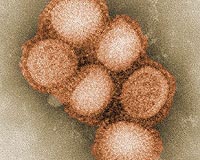 |
Washington (UPI) Aug 24, 2010 With this year marking 30 years since smallpox was declared eradicated, the World Health Organization is working to finish the job. In preparation for next year's World Health Assembly meeting, the WHO is reviewing the current research on the virus -- considered one of the most devastating in history -- to schedule its destruction. In 2006, the WHO set a deadline for the destruction of all stores of the smallpox virus worldwide: June 30, 2010. It wasn't the first deadline and it won't be the last. In 2007, the WHO decided to stall, delaying setting another deadline until 2011. The culprit for the delay has a familiar face. Despite the 1996 assembly vote to destroy the virus, the United States and Russia, which possess the only known stocks, haven't complied, arguing there is more research to be done and asking for more time. Dr. Donald A. Henderson, who directed the WHO's successful smallpox eradication campaign from 1966-77, said other countries see this refusal as a patronizing display of arrogance. "Here we are, it's Big Brother Russia and Big Brother United States telling us what to do," said Henderson, who is a distinguished scholar at the Center for Biosecurity at the University of Pittsburgh. But Henderson disagrees with the "big brother" characterization. "We were the ones who really suffered for this disease and worked to get rid of it," he said. Henderson said the American and Russian labs came into possession of the smallpox virus during the beginning of the eradication effort in the 1960s. They volunteered to help with the routine process of diagnosing the disease, which is fatal as much as 30 percent of the time. While there were other labs that worked with smallpox, Henderson said the WHO became concerned with lax security procedures and wanted to better contain the virus and regulate research. The WHO recommended limiting the stores to those in Atlanta and Russia in 1994. Henderson said some countries sent their stocks to the approved labs, while others destroyed their stores of the virus. In 2005, many were alarmed when the United States revealed plans to genetically engineer and further experiment with the smallpox virus. The announcement added urgency to opponents' calls for the WHO to strengthen its oversight of smallpox research, which they felt was lacking. Evidenced by the World Health Assembly's vote and reaffirmations at subsequent meetings, there is widespread support for destroying existing stocks of the virus. Edward Hammond, director of the Sunshine Project, which advocates against misuse of biotechnology, wrote in 2007 that vaccines and diagnostic tests are effective enough to merit halting research on smallpox. He said the United States' continued refusal to destroy the contagious, sometimes fatal, virus as a matter of national security sends other countries the message that they, too, must obtain it for their security. It is unknown whether illicit stores of smallpox exist outside Atlanta and Russia. "The decades old eradication job of WHO will be completed and the world will be safer, when the U.S. and Russian smallpox virus stocks are finally destroyed," Hammond wrote. In 2007, Dr. John O. Agwunobi, who was assistant secretary for health at the U.S. Department of Health and Human Services, wrote it would be "short-sighted" to destroy stores of the virus. He said further research could yield an effective treatment, of which there is none currently, as well as improved diagnostic tests and vaccines. The population is particularly vulnerable because it's largely unvaccinated, Agwunobi said. The United States stopped vaccinating against smallpox in 1972.
Share This Article With Planet Earth
Related Links Epidemics on Earth - Bird Flu, HIV/AIDS, Ebola
 Swine flu continues to spread in New Zealand, 10 dead
Swine flu continues to spread in New Zealand, 10 deadWellington (AFP) Aug 23, 2010 Swine flu is continuing to spread in New Zealand, health officials said Monday as the death toll rose to 10 and some areas reported more people in hospital than during last year's pandemic. Although the World Health Organization (WHO) has declared the global pandemic over, H1N1 "is the most common strain of influenza circulating" in New Zealand, director of public health Mark Jacobs said. ... read more |
|
| The content herein, unless otherwise known to be public domain, are Copyright 1995-2010 - SpaceDaily. AFP and UPI Wire Stories are copyright Agence France-Presse and United Press International. ESA Portal Reports are copyright European Space Agency. All NASA sourced material is public domain. Additional copyrights may apply in whole or part to other bona fide parties. Advertising does not imply endorsement,agreement or approval of any opinions, statements or information provided by SpaceDaily on any Web page published or hosted by SpaceDaily. Privacy Statement |